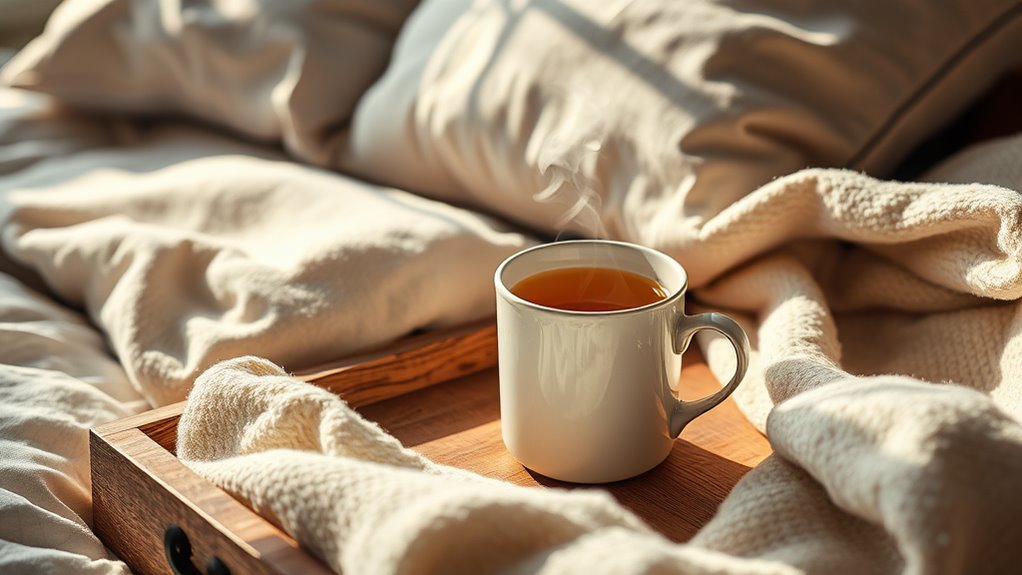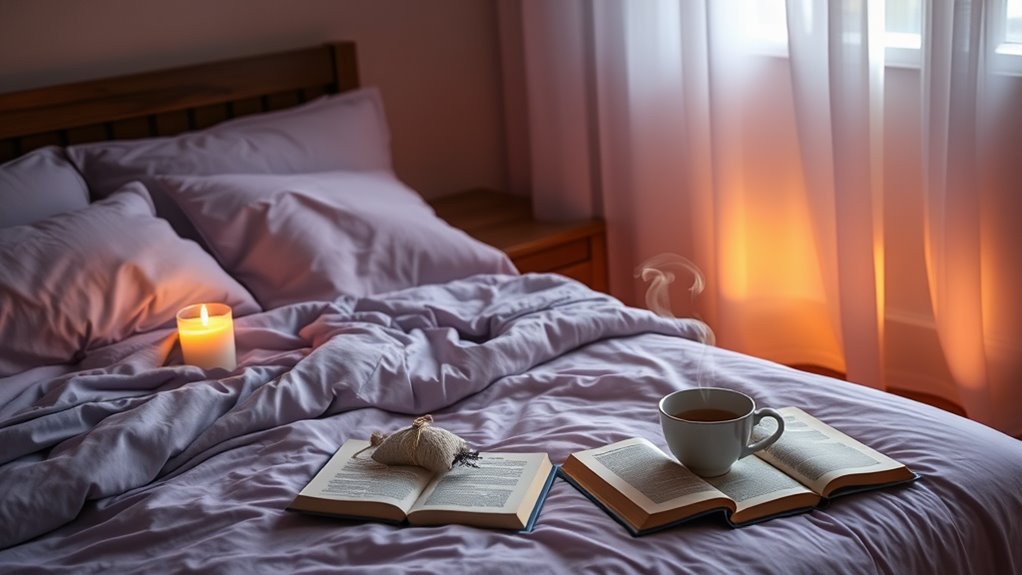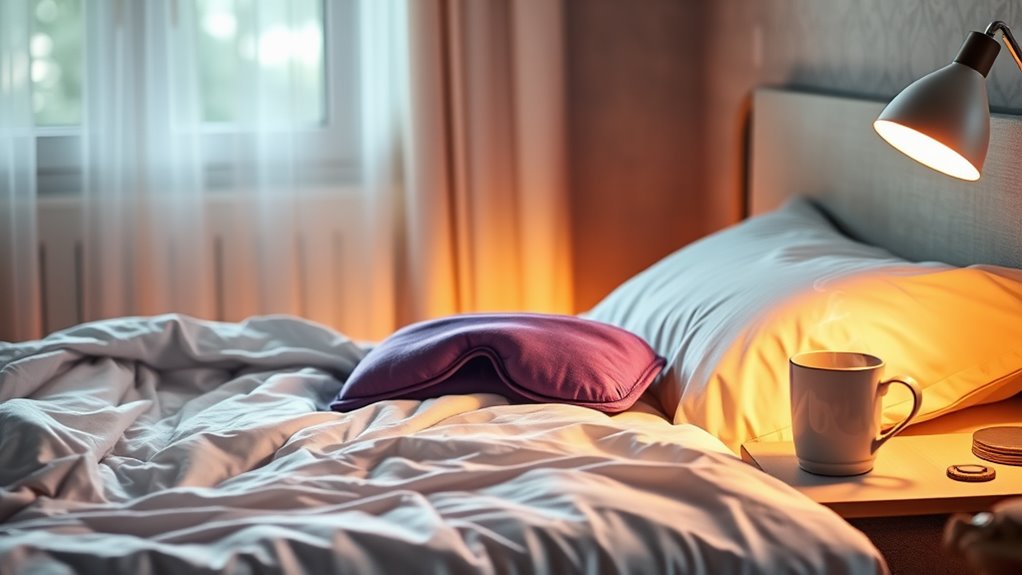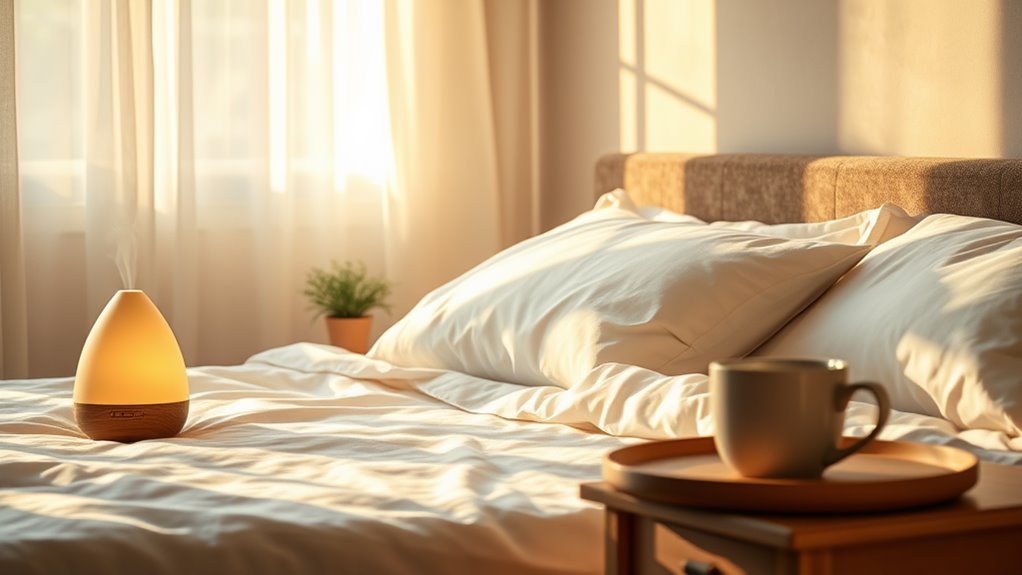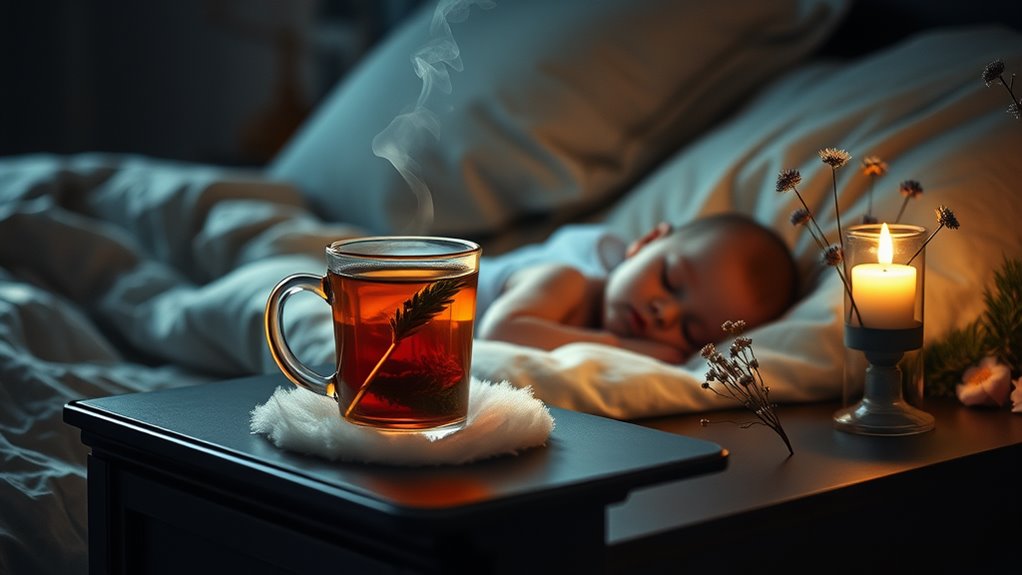This Bedtime Tea Calms Your Mind & Body Like a Hug
Did you know that valerian root, a key ingredient in this bedtime tea, influences GABA receptors to reduce brain activity? You’ll find it works with chamomile and lavender to ease anxiety, setting the stage for deeper relaxation and better sleep ahead.
The Soothing Ingredients in This Bedtime Tea
This bedtime tea features several key ingredients that promote relaxation, such as chamomile, lavender, and valerian root.
As you incorporate this bedtime herbal tea for sleep into your routine, chamomile’s apigenin binds to benzodiazepine receptors, reducing anxiety based on clinical studies.
Lavender’s linalool interacts with your glutamate system, calming the nervous system as evidenced by aromatherapy research.
Valerian root increases GABA levels, supporting natural unwinding through neurotransmitter modulation in trials.
These evidence-based herbs blend precisely to enhance your sleep preparation objectively. Additionally, incorporating essential oils for calmness can further elevate your relaxation experience.
How This Tea Eases Your Mind
As you sip this bedtime tea, it actively relaxes your nervous system by targeting stress responses with its natural compounds. This effect quiets the chatter in your mind, fostering a calmer mental state. Studies on these ingredients confirm their role in promoting relaxation without causing drowsiness. Additionally, certain herbs in this tea have been shown to enhance natural sleep quality, making it an ideal choice for those seeking restorative rest.
Relaxes Nervous System
Bedtime tea calms your nervous system through key ingredients like chamomile and valerian, which interact with brain receptors to reduce anxiety.
These compounds promote relaxation by modulating neurotransmitters.
-
Chamomile’s flavonoids bind to GABA receptors, inhibiting overactivity and fostering calm.
-
Valerian root boosts GABA production, diminishing stress signals in your brain.
-
The tea’s antioxidants combat oxidative stress, supporting neural balance.
-
Clinical studies show it enhances parasympathetic activity, aiding recovery from daily strain.
Quiets Mind Chatter
Beyond relaxing your nervous system, bedtime tea quiets mind chatter by targeting the brain’s overactive thoughts with its key compounds. These ingredients modulate neurotransmitters like GABA, reducing anxiety and fostering mental clarity. You’ll notice intrusive thoughts fade as the tea promotes alpha brain waves.
| Compound | Effect on Mind |
|---|---|
| Chamomile | Reduces racing thoughts |
| L-theanine | Enhances relaxation waves |
| Valerian Root | Soothes mental agitation |
| Lavender | Calms emotional turbulence |
Evidence shows this combination helps you achieve a serene state, easing into restful sleep.
Simple Steps to Prepare Your Tea
To prepare your bedtime tea effectively, you’ll first gather the ingredients like herbal leaves or tea bags and fresh water.
Next, you boil the water to a gentle simmer, ensuring it’s hot enough for optimal extraction.
Then, you steep the tea for the recommended time to release its calming compounds. Incorporating a bedtime ritual that includes natural relaxation techniques can enhance the overall calming effect of your tea.
Gather Ingredients
First, gather these essential ingredients for your bedtime tea: 1-2 teaspoons of dried chamomile flowers, a few fresh lavender buds, and a teaspoon of honey. Chamomile contains apigenin, which promotes relaxation, while lavender offers soothing aromatics, and honey provides natural sweetness with potential antioxidants.
- Select high-quality, organic chamomile to avoid contaminants.
- Choose fresh lavender from reliable sources for optimal potency.
- Pick raw, unprocessed honey for its beneficial compounds.
- Measure ingredients precisely using standard kitchen tools for consistency.
Boil Water
Once you’ve gathered your ingredients, bring a kettle of water to a rolling boil, ensuring it’s hot enough to extract the calming compounds from chamomile and lavender effectively.
This process maximizes the release of essential oils and flavonoids, as supported by herbal research, which shows heat enhances solubility. Use a clean kettle to prevent impurities, and aim for a vigorous boil—around 212°F at sea level—for about 1-2 minutes.
You’ll notice bubbles breaking the surface consistently, signaling optimal temperature without wasting energy. This step sets the foundation for a soothing brew, promoting relaxation through evidence-based preparation.
Steep Tea
With the water at a rolling boil, you’ll pour it over your chamomile and lavender tea bag or loose leaves in a heat-safe cup or teapot.
Let the tea steep to release its calming compounds, like apigenin in chamomile, which promotes relaxation. For optimal extraction, follow these steps:
-
Steep for 5-7 minutes: This duration maximizes flavonoids without bitterness, based on herbal tea studies.
-
Cover your cup: It traps steam, enhancing infusion and preserving volatile oils in lavender.
-
Avoid over-steeping: Beyond 10 minutes, tannins can make the tea astringent, reducing enjoyment.
-
Strain and sip: Remove solids to prevent over-extraction, ensuring a smooth, soothing brew.
Benefits for Restful Sleep
Because bedtime tea contains herbs like chamomile and valerian root, which research links to reduced anxiety and enhanced melatonin production, you’ll likely enjoy deeper, more restorative sleep.
Studies, such as one in the Journal of Clinical Sleep Medicine, show chamomile improves sleep quality by promoting relaxation and reducing insomnia symptoms.
Valerian root enhances GABA activity, helping minimize nighttime awakenings for longer REM cycles.
These benefits lead to better memory consolidation and emotional balance, allowing you to wake refreshed and support overall health without disrupting daily routines. Additionally, incorporating lifestyle changes alongside herbal remedies can significantly enhance sleep quality.
Ways to Maximize Relaxation Effects
To maximize the relaxation effects of your bedtime tea, combine it with simple routines like brewing at the ideal temperature—around 200°F for chamomile—to preserve its active compounds, as studies in the Journal of Agricultural and Food Chemistry confirm this enhances bioavailability. This approach boosts efficacy.
-
Incorporate deep breathing****: Pair your tea with 5-minute sessions, as research in the Journal of Clinical Psychology shows this reduces stress hormones. Additionally, you can utilize the 4-7-8 breathing technique to further enhance calmness.
-
Maintain a quiet space****: Dim lights and minimize noise, per sleep studies in Sleep Medicine Reviews, to amplify calming responses.
-
Sip mindfully: Focus on the aroma and taste, which mindfulness research in Mindfulness journal links to lower anxiety.
-
Time it right: Drink 30-60 minutes before bed, supported by circadian rhythm studies in Chronobiology International, for optimal wind-down.
Variations for a Personalized Experience
While everyone’s preferences vary, you can personalize your bedtime tea by experimenting with ingredients like lavender for deeper calm or valerian root for enhanced sleep, as supported by studies in Phytotherapy Research showing these adaptogens reduce anxiety levels effectively.
Try adding chamomile, which research in the Journal of Agriculture and Food Chemistry links to better sleep quality, or passionflower for stress relief, backed by evidence in the Journal of Ethnopharmacology. Incorporating natural detox methods into your routine can also enhance overall health, potentially improving sleep quality.
Adjust ratios based on your needs—start small to avoid interactions—and combine elements for a tailored blend that promotes relaxation without overwhelming your system. Always consult a professional.

